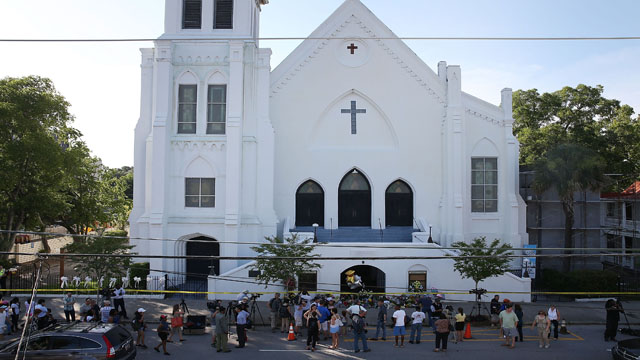
People stand outside the Emanuel AME Church after a mass shooting at the church that killed nine people on June 17, 2015, in Charleston, South Carolina (Photo: Joe Raedle/Getty Images)
Attorneys for the Federal Bureau of Investigation filed a motion Friday to dismiss a lawsuit over the Charleston Church shooting.
In the 35-page response, the FBI denies any liability for a breakdown in the federal government’s firearms background check process, which allowed 21-year-old Dylann Roof to buy a .45-caliber Glock handgun two months before opening fire during a bible study at the Emanuel African Methodist Episcopal Church on June 17, 2015, killing nine parishioners.
Stephen Hurd, the husband of one of the victims, filed a complaint in federal court against the FBI in July, alleging the agency’s negligence bore responsibility for the death of his wife and five others listed in the lawsuit.
“The shooting at the Emanuel AME Church was an atrocity of unspeakable proportions,” federal attorneys write on the final page of the dismissal request. “The perpetrator’s actions were despicable. But the United States is not liable in tort for the tragic death of plaintiff’s decedent.”
FBI Director James Comey said in the weeks after the shooting inaccurate data collected from Roof’s criminal record spurred a breakdown in the agency’s background check process. Roof was arrested on felony drug charges in February 2015, but clerical errors in the local law enforcement reporting process didn’t record his admission of guilt — a detail, Comey said, should have returned an automatic rejection to the firearms dealer in Columbia where Roof bought the gun.
Instead, the dealer proceeded with the transaction after the three-day waiting period had expired, despite the Roof’s “pending” background check — a decision Comey says is well within the rights of the law.
Federal attorneys reiterate this point in court documents Friday, saying “while the Brady Act authorizes the FBI to temporarily freeze firearms sales for three business days while it researches whether state or federal law prohibits a particular buyer from possessing a firearm, the FBI has no authority to prevent a sale if, after those three business days have elapsed, it has not yet found definitive information demonstrating that the prospective purchaser’s receipt of a firearm would violate federal or state law.”
Authorities charged Roof with 33 federal offenses, including hate crime charges, after investigators learned the self-identified white supremacist admitted to a friend he targeted the historically black church with the intention of starting a race war.
He awaits federal trial in November and will face a state court early next year. Prosecutors in both jurisdictions are seeking the death penalty.
The clerical error uncovered in the case came to be known as the “Charleston Loophole.” Democratic lawmakers in South Carolina have tried — and failed — to pass legislation extending the waiting period by as much as 28 days in an attempt to close the loophole, though Republican legislators believe it’s a “non-issue.”
“The feds dropped the ball,” Rep. Greg Delleney, R-Chester, told The Post and Courier in August. “There’s really no Charleston loophole.”
A special panel of state senators convened last month in hopes of drafting reform measures capable of passing the Republican-controlled Legislature, though leading GOP officials have expressed doubt a compromise is possible.
The post FBI files motion to dismiss Charleston Church shooting lawsuit appeared first on Guns.com.
